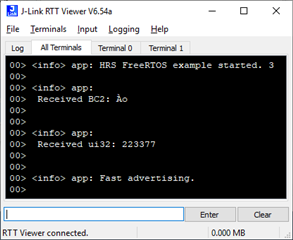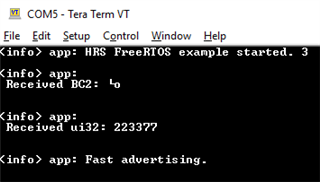By some strange reason the thread with my previous question cant accept any replies (and missing the toolbar that appears on the other threads: "Reply Like More"), so will continue here:
Thanks for the answers:
Regarding p.2 – I already mentioned “And I tried almost all combination for the type of the buffer or casting it in the NRF_LOG_INFO statement”, so here is attached and exactly the variant with the char buffer – same problem – but only happens when use FreeRTOS. In the examples without FreeRTOS I tried so far, the snippet works perfect and with char and with uint8_t
NRF_LOG_INFO("HRS FreeRTOS example started. 3");
char bc_buf2[] = {'9','7','5','3','\0'};
NRF_LOG_INFO("\n Received BC2: %s \n", bc_buf2); //WTF doesnt print %s
uint32_t uint2 = 223377;
NRF_LOG_INFO("\n Received ui32: %d \n", uint2); // %d is Ok
Tera Term output:
<info> app: HRS FreeRTOS example started. 3
<info> app:
Received BC2: Ào
<info> app:
Received ui32: 223377
<info> app: Fast advertising.
JLink RTT Viewer output:
00> <info> app: HRS FreeRTOS example started. 3
00>
00> <info> app:
00> Received BC2: Ào
00>
00> <info> app:
00> Received ui32: 223377
00>
00> <info> app: Fast advertising.
00>

Regarding p.1 – is there anywhere in the documentation written the explanation you posted as I guess there will be and other differences, but the only place I found in the docs regarding FreeRTOS implementation is quite scanty
https://infocenter.nordicsemi.com/index.jsp?topic=%2Fsdk_nrf5_v16.0.0%2Ffreertos.html



